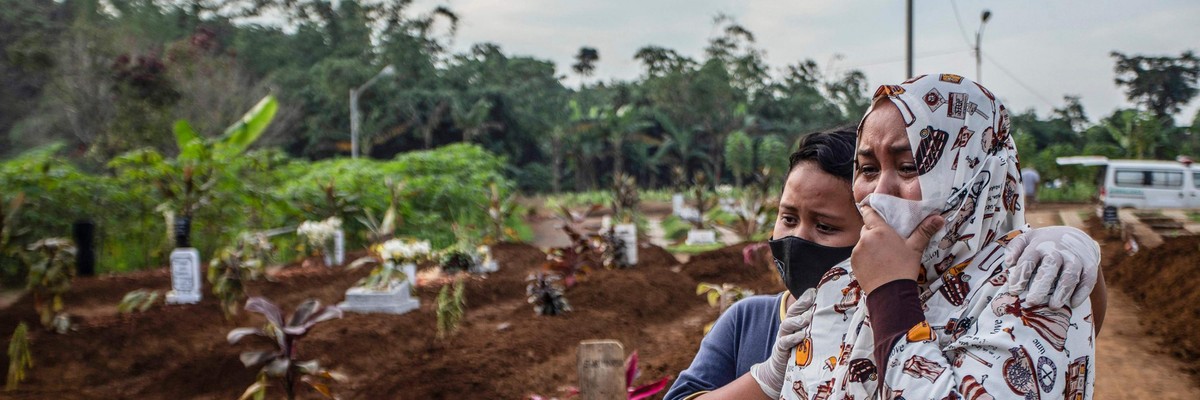An international coalition of humanitarian groups warned Tuesday that "more variants will emerge" if Congress fails to approve new money for the global coronavirus response, a message delivered after senators announced a Covid-19 funding package without any money to fight the pandemic beyond the borders of the United States.
"We are deeply disappointed by the Senate's short-sighted decision to cut off all global Covid funds."
"Until we commit to providing the necessary resources to combat Covid-19 globally," reads a joint statement signed by the ONE Campaign, Save the Children, Oxfam America, Public Citizen, and dozens of other groups, "more people will contract the virus and the death toll will continue to rise."
The humanitarian coalition noted that U.S. federal agencies responsible for global relief "are running out of funds," echoing the concerns of the agencies themselves. For months, the U.S. Agency for International Development (USAID) has been sounding the alarm over dwindling money for its global vaccination efforts.
The Pentagon, meanwhile, is overflowing with money--and lawmakers are currently mulling whether to pile even more funds into the department's coffers.
"We are deeply disappointed by the Senate's short-sighted decision to cut off all global Covid funds," the aid groups said Tuesday. "If passed, this package would send the signal that Congress has not only turned its back on the rest of the world, but it risked the safety and security of the American people and contributed to prolonging the pandemic.
Related Content
For Fraction of Pentagon Budget, World Could Prevent 1.5 Million Covid Deaths
Jake Johnson
The coalition released its statement after key senators' announced Monday that they reached a deal on a $10 billion coronavirus funding package aimed at helping the U.S. purchase additional coronavirus test kits, therapeutics, and vaccines amid growing fears of a new wave of infections.
"Without global vaccination funding, we are simply not tackling the problem of Covid."
The proposed legislative package, which would be funded largely by repurposing previously approved pandemic response money, contains $10 billion total, less than half of the $22 billion in coronavirus aid that the Biden administration has requested to keep domestic Covid-19 programs afloat.
As the New York Timesreported late Monday, the legislation "does not include $5 billion in funding for the global vaccination effort that had previously been proposed, after senators spent the weekend haggling over a Republican demand to claw back money Congress previously approved."
Senate Majority Leader Chuck Schumer (D-N.Y.) said in a floor speech Tuesday that he is "disappointed that some of our Republican friends could not agree to include $5 billion for global response efforts."
Schumer nevertheless urged Congress to quickly approve the $10 billion package, arguing that it "will give the federal government--and our citizens--the tools we need, that we depend on, to continue our economic recovery, to keep schools open, keep American families safe."
The Senate majority leader said the legislation as crafted has the support of President Joe Biden.
But the bill, negotiated principally by top Senate Democrats and Sen. Mitt Romney (R-Utah), could face trouble in the House, where progressive lawmakers have warned they may oppose any Covid-19 funding measure that lacks adequate money for the global pandemic response.
"My position has not changed," Rep. Raja Krishnamoorthi (D-Ill.) tweeted Monday afternoon. "If the Senate cuts global vaccine funding from the Covid supplemental bill, we will have a big problem in the House."
Rep. Pramila Jayapal (D-Wash.), chair of the Congressional Progressive Caucus, similarly declared Monday that "a deal without global aid funding and a real plan to invest the money we need will run into problems in the House."
"I have said this for months and will say it again," Jayapal wrote on Twitter. "Without global vaccination funding, we are simply not tackling the problem of Covid."
Lawmakers' haggling over several billion in critical global coronavirus aid is taking place as Congress also debating Biden's request to add $31 billion to the U.S. military budget next fiscal year, bringing the total to an unprecedented $813 billion.
As Politico reported Tuesday, "Debate is heating up on Capitol Hill on funding the military, and Democrats are facing a dilemma--back President Joe Biden's historically high Pentagon budget or spend even more."
"This is insane," responded Matt Duss, a foreign policy adviser to Sen. Bernie Sanders (I-Vt.), who has criticized the president's latest Pentagon budget request.
"Meanwhile, Congress is having a hard time finding $5 billion for the global Covid response, a genuinely urgent national security priority which would also offer a huge boost to U.S. diplomacy," Duss added. "Unfortunately the poor of the Global South employ fewer lobbyists."


